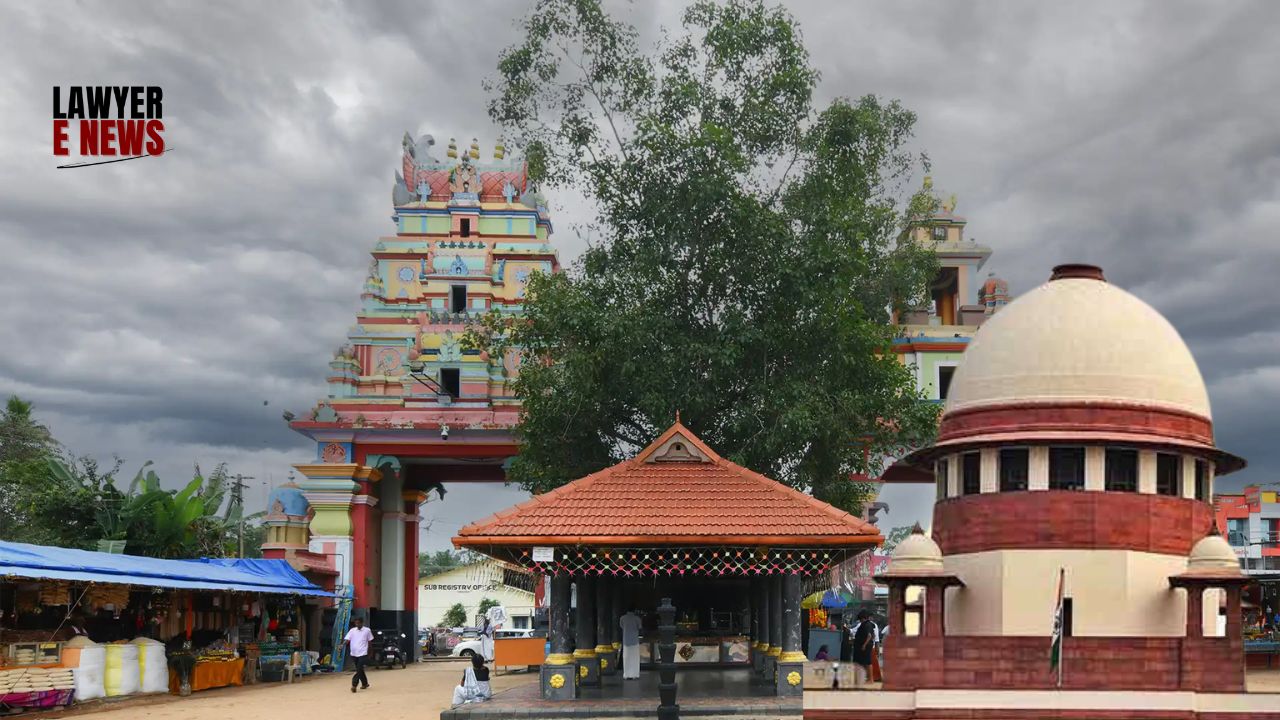-
by Admin
15 February 2026 5:35 AM



High Court's Role Ends After Disposing Appeal; Further Interventions Are Coram Non Judice - Supreme Court of India delivered a significant ruling in the case of Oachira Parabrahma Temple & Anr. v. G. Vijayanathakurup & Ors., addressing the scope of judicial powers post-disposal of an appeal. The Court held that the Kerala High Court became functus officio after deciding a Regular First Appeal (RFA) concerning the temple's administration and had no jurisdiction to entertain further applications altering its prior orders. The Supreme Court modified the High Court's orders and directed fresh elections for the temple’s management under the supervision of a newly appointed Administrative Head.
The Oachira Parabrahma Temple, an ancient temple in Kerala, operates without a deity or sanctum sanctorum and oversees several institutions, including a super-specialty hospital and nursing college. Its administration is governed by a three-tier system under its Bye-laws: the General Board (Pothubharana Samithi), Working Committee (Pravarthaka Samithi), and Executive Committee (Karya Nirvahana Samithi).
In 2010, a preliminary decree by a district court directed the framing of a new Scheme for the temple’s management while continuing administration under its Bye-laws. This decree was appealed by hereditary trustees (Sthanis) in the Kerala High Court. By its order in 2020, the High Court directed the appointment of a retired High Court judge as an Administrative Head to oversee the temple until a new Scheme was finalized. Subsequently, in 2023, the High Court removed the elected Executive Committee and appointed an unelected five-member committee to manage the temple.
Challenging the High Court's orders, the appellants, who were elected members of the Executive Committee, approached the Supreme Court, arguing that the High Court had acted beyond its jurisdiction.
Whether the Kerala High Court, having disposed of the RFA in 2020, was functus officio and lacked jurisdiction to entertain subsequent applications.
Whether the High Court was justified in removing the elected Executive Committee and appointing an unelected body contrary to the Bye-laws.
The appellants argued that the High Court's actions violated the doctrine of functus officio and undermined the Bye-laws, which mandate a five-year tenure for elected bodies.
The Supreme Court held that the High Court exceeded its jurisdiction by passing orders after disposing of the appeal. Citing the doctrine of functus officio, the Court emphasized:
"Once the High Court had concluded the proceedings in the RFA, it ceased to have any authority to entertain further applications in the same matter. Such actions are coram non judice and legally unsustainable."
The Court clarified that post-disposal of an appeal, parties should seek remedies in the appropriate forum, such as the trial court handling the Scheme's finalization.
The Supreme Court underlined the primacy of the temple’s Bye-laws, which guarantee elected administration. It observed:
"The High Court’s appointment of an unelected committee disregards the democratic process prescribed under the temple’s Bye-laws. Such interference must be limited to extraordinary situations and consistent with the governing rules."
The Court found that while there were administrative disputes, the removal of elected bodies without elections violated the principles of democratic governance.
Recognizing the need for interim measures to ensure smooth administration, the Court appointed a new Administrative Head to oversee fresh elections. The Court remarked:
"The sanctity of elected representation must be restored promptly. Until elections are conducted, an independent Administrative Head shall oversee the temple's administration."
The Supreme Court passed the following key directives:
Appointment of Administrative Head: Retired Kerala High Court Judge, Justice K. Ramakrishnan, was appointed to supervise the temple's administration and conduct elections within four months.
Election Process: The Administrative Head was tasked with finalizing the voters’ list, conducting elections as per the Bye-laws, and filing a compliance report with the Court.
Honorarium and Expenses: The Administrative Head and his team would be compensated from the temple’s funds, with detailed honorarium rates specified.
Continuation of Existing Arrangements: Current administrative arrangements would continue until the new Administrative Head assumed charge.
Final Decree Proceedings: The trial court was directed to expedite the framing of the Scheme and resolve all pending disputes in the final decree proceedings.
Termination of Prior Appointments: The previously appointed Administrative Head and Advocate Commissioner by the High Court were directed to hand over all records and accounts to the new Administrative Head.
The Supreme Court’s ruling strikes a balance between upholding the Bye-laws governing temple administration and ensuring transparent and fair management. By emphasizing the doctrine of functus officio, the Court reaffirmed the limits of judicial authority and the importance of adherence to procedural rules.
Date of Decision: December 3, 2024
